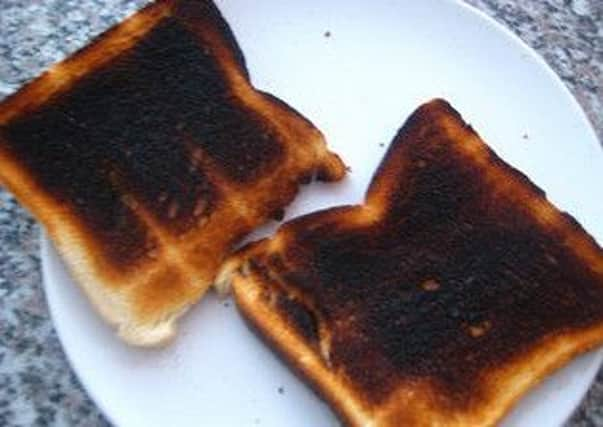Can burnt toast really cause cancer?


The Food Standards Agency (FSA) has issued a public warning over the risks of acrylamide - a chemical compound that forms in some foods when they are cooked at high temperatures (above 120C).
A new campaign tells people how they can cut their risk, including opting for a gold colour - rather than darker brown - when frying, roasting, baking, grilling or toasting.
Advertisement
Hide AdAdvertisement
Hide AdAcrylamide forms due to a chemical reaction between certain sugars and an amino acid (asparagine) in the food.


However, boiling, steaming and microwaving appear far less likely to cause the reaction.
Studies in mice have shown that high levels of acrylamide can cause neurological damage and cancer.
While studies in humans have proved inconclusive, experts believe the compound has the ability to cause cancer in humans.
Advertisement
Hide AdAdvertisement
Hide AdIn its new campaign, the FSA said people could take simple steps to reduce their consumption of acrylamide.


As a ‘rule of thumb’, people should aim for a golden yellow colour or lighter when frying, roasting, baking or toasting starchy foods.
For example, roast potatoes should not be ‘fluffed up’ to maximise dark brown crispy bits and they should be roasted to the lightest colour that is acceptable.
Toast should be browned to a light brown colour.
Gavin Shears, a senior policy adviser in contaminants at the FSA, said: ‘We are not expecting people to go out and radically change their diets if they’re eating a healthy balanced diet.
Advertisement
Hide AdAdvertisement
Hide Ad‘If you slightly overdo your roast potatoes on a Sunday, it’s not that you have to throw them away. We’re not asking people to cut out certain foods.
‘This is about reducing your overall lifetime risk through simple steps.’
There are no official limits on how much acrylamide a food can contain, although the EU has drawn up guidelines.
Giota Mitrou, director of research funding at the World Cancer Research Fund, said: ‘This is interesting advice; however, more research is needed to fully understand the link between acrylamide and cancer.
Advertisement
Hide AdAdvertisement
Hide Ad‘Our own research did not find any strong evidence that acrylamide affects cancer development.
‘There are many other things that people can do to reduce their cancer risk, such as not smoking, maintaining a healthy weight and avoiding drinking alcohol.’